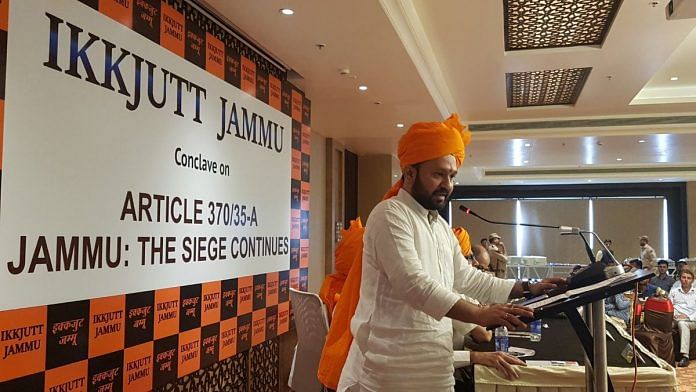
Thank you dear subscribers, we are overwhelmed with your response.
Your Turn is a unique section from ThePrint featuring points of view from its subscribers. If you are a subscriber, have a point of view, please send it to us. If not, do subscribe here: https://theprint.in/
Ikkjutt Jammu, the erstwhile pressure group has been metamorphosed and has recently received the recognition as a political party from the Election Commission of India. This has added a new dynamic to the Kashmir dominated political ecosystem of this UT. Though, on the face of it, this new political party appears to be an oxymoron, but it has definitely rekindled some hopes in the indifferent masses, atleast on the Social Media. Kochanek calls this phenomenon as “Regionalisation of Political Parties”.
It might seem a bit ironic but, Jammu, as we know today, has never been a united political entity historically except for some short durations in Pre Dogra-Rule. The emergence of the Jamwal Dynasty provided Jammu with a semblance of political unification, hitherto absent. After independence too, Jammu remained politically emasculated due to the hardwired policies of the Kashmir centric governments which inevitably kept Jammu disempowered and the batons were carried by the Kashmiris at the behest of Delhi.
In this respect, IkkJutt Jammu, aiming for outflanking the BJP on its right has emerged as another alternative for the people of Jammu, for their agenda typifies the smoldering issues of Jammu region, which the BJP government took no notice of. There is an undercurrent of angst against BJP on many fronts. The foremost being the latter of being highly hostile to the people of Jammu. The youth of Jammu feels that BJP in its gambit to expand in the Kashmir valley has consistently thwarted any attempt of empowering Jammu.
In 2015, when BJP had had a chance to deliver a knocking punch to the Kashmir centric hegemony, it prostrated before Mufti led JKPDP, and squandered yet another eventful opportunity for Jammu’s rightful rise. This was a clear betrayal of the Jammu’s electoral mandate. BJP’s bravado of using J&K card in cashing in votes of other states’ election has also not been well appreciated.
Admittedly, the BJP’s failure to provide employment and thence recruitment aberrations post abrogation of Article 370 has landed them in choppy waters with the people of Jammu. This new development also challenges the centralization of Indian politics vis-a-vis Jammu in particular, as the presence of NC and PDP provided Kashmir a sustainable bargaining chip for New Delhi while Jammu was pushed to the wall, languishing in between the chasm that developed between Delhi and Kashmir over the years. This conundrum was brought to the sharp relief when Jammu repaired itself into the cocooning womb of the Kashmir, losing its character, culture and cohesion. This manifests clearly when we see our Mubarak Mandi crumbling with each passing day. We witness it when we see two-decade old Artificial Lake Project in limbo. We experience it while we visit places like Akhnoor, Ramnagar, Reasi , Bhaderwah, which were brazenly ignored at the cost of Kashmir. Nevertheless, some concerns continue to surface regarding this new political outfit.
Firstly, how it’s going to bridge the gulf between the religious communities, who though seem pacified at the very surface, have deep fault lines. This entire façade is hanging by a very fine thread of gossamer, whose strength is questionable. The coining of terms like Zameen Jihad post Roshni verdict has severely dented IJ’s image in the Muslim pockets of the province. Secondly, the organisation, as of now, is more visible in the Dogri speaking belts of Jammu province. Thirdly, its growth paradigm shall be challenging given the crunched political space in the region, especially after the rise of BJP post 2014. At present, it can seek votes only by infiltrating the vote banks of the BJP, which lately has short-changed Jammu and peddle jingoism and peripheral agendas of the centre.
Even the earlier experiments like Panthers Party couldn’t sustain the momentum for long and are lurking into an uncertain existential crisis. Therefore, in order set foot right in Jammu province, IJ must take into consideration the fault lines and regional disconnect prevailing in this region. Its efforts to bring the alienated regions into the larger structure of Jammu must be devised in a manner that is not communal, egregious or overpowering. It’d be a major faux pas if everything gets centred around the Dogri speaking belts of the Jammu region. If IJ has to succeed then it must ensure that a sustainable, cohesive and united front comprising of all sub regional communities, linguistic & religious factions and ethnicities are given due representation.
That’s why Lt Gen Bhopinder Singh said that “Dividing the ‘voice’ and case of Jammu by inserting wholly political agendas that addresses only partisan concerns, does unimaginable discredit to the glorious traditions and grandeur of the Dogras”.
These pieces are being published as they have been received – they have not been edited/fact-checked by ThePrint.
Also read: Ikkjutt Jammu gets registered as political party by ECI

COMMENTS